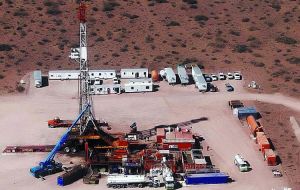MercoPress. South Atlantic News Agency
Argentina confident Patagonia's shale formation foreign interest remains strong
 “Vaca Muerta will continue to be for YPF and, for the country, a very good option to regain the energy sovereignty,” minister Aranguren said
“Vaca Muerta will continue to be for YPF and, for the country, a very good option to regain the energy sovereignty,” minister Aranguren said  The minister highlighted the agreement signed between the government and oil companies to keep the oil barrel at an average of US$70
The minister highlighted the agreement signed between the government and oil companies to keep the oil barrel at an average of US$70  According to the US Geological Service Argentina's shale deposits are among the world's largest discoveries, together with those of the US and China.
According to the US Geological Service Argentina's shale deposits are among the world's largest discoveries, together with those of the US and China. Argentina's Vaca Muerta shale formation in Patagonia remains an attractive asset for international investors, many of which are looking to increase the amount they have invested so far, according to the country's Energy Minister Juan José Aranguren, a former Shell Argentina CEO.
Argentina's state controlled oil and gas company YPF is currently working in several areas of Vaca Muerta through partnerships with US giant Chevron, Malaysian oil and gas company Petronas, Pan American Energy (PAE), Dow and American Energy Partners — two of which signed up recently.
“Vaca Muerta will continue to be for YPF and, for the country, a very good option to regain the energy sovereignty,” Aranguren said. “YPF has some interesting assets and is in condition to partner up with other companies, hoping to recover oil and gas production so to guarantee enough energy for the country.”
“The interest of foreign investors is a clear demonstration of the new era in Argentina, much more open to the world. If we want to integrate with the region, we need investment,” Aranguren said. “There are plenty of areas in which investors could focus as we have both renewable and non-renewable high-quality resources. There are plenty of people already interested.”
According to the US Geological Service Argentina's shale deposits are among the world's largest discoveries, together with those of the US and China.
Regarding oil prices, Aranguren said that’s a variable that can’t be controlled from Argentina but forecast a recovery, claiming prices will continue to go up but at a slower pace than initially believed.
Aranguren highlighted the agreement signed between the Argentine government and oil companies to keep the oil barrel at an average of US$70 despite the global fall of prices.
“It’s a sustainable price. The difference with global prices is to maintain the activity of the oil industry, especially in those provinces focused on hydrocarbon resources. The industry is a good source of tax collection for the national and provincial governments thanks to oil royalties,” he said.
However Argentina's oil industry s facing another challenge, workers are asking for a 40% wage increase, while companies would be willing to grant a 30%. Nevertheless, wage talks haven’t officially started yet.




Top Comments
Disclaimer & comment rules-

-

-

Read all commentsFalkland Islanders must be addressed ”as Argentines or foreigners living in (mainland) Argentina
May 26th, 2016 - 10:12 am 0We can both play that game.
Patagonians must be addressed ”as British falklanders or foreigners living in (mainland) Falkland's territory.
sound nice.
The new Argentine government, already dealing with interannual inflation of nearly 42 percent, will continue to bankrupt itself with exorbitant price supports for petroleum of low quality that is expensive to extract, while natural gas is piped into the country from Chile for double the price of Bolivian natural gas.
May 26th, 2016 - 01:49 pm 0@2
May 26th, 2016 - 02:24 pm 0You are right but the idea is to avoid unemployment in the Patagonia since oil industry is one of the most important one in the area.
There are little gas production in Argentina.
Commenting for this story is now closed.
If you have a Facebook account, become a fan and comment on our Facebook Page!